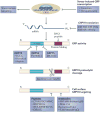Glucose-regulated proteins in cancer: molecular mechanisms and therapeutic potential
- PMID: 24658275
- PMCID: PMC4158750
- DOI: 10.1038/nrc3701
Glucose-regulated proteins in cancer: molecular mechanisms and therapeutic potential
Abstract
The glucose-regulated proteins (GRPs) are stress-inducible chaperones that mostly reside in the endoplasmic reticulum or the mitochondria. Recent advances show that the GRPs have functions that are distinct from those of the related heat shock proteins, and they can be actively translocated to other cellular locations and assume novel functions that control signalling, proliferation, invasion, apoptosis, inflammation and immunity. Mouse models further identified their specific roles in development, tumorigenesis, metastasis and angiogenesis. This Review describes their discovery and regulation, as well as their biological functions in cancer. Promising agents that use or target the GRPs are being developed, and their efficacy as anticancer therapeutics is also discussed.
Figures




References
-
- Lee AS. GRP78 induction in cancer: therapeutic and prognostic implications. Cancer Res. 2007;67:3496–3499. - PubMed
Publication types
MeSH terms
Substances
Grants and funding
LinkOut - more resources
Full Text Sources
Other Literature Sources

